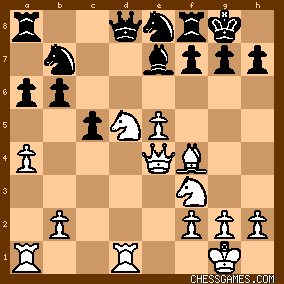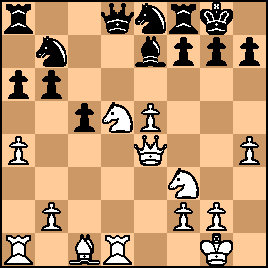| Dec-28-02 | | mj29479: i think 12.Bd6 would have yielded better results for blacks. |
|
| Dec-28-02 | | pawntificator: It would help a little, but against Rubinstein in this position, I don't think it would help enough, or for very long. |
|
| Nov-13-03 | | Kenkaku: Interesting that Lasker denounces the QGA Classical here (signified by 6...c5). It reminds me of Blackburne playing the (first according to this database) Nimzo-Indian and saying that not much good comes of it. |
|
Nov-13-03
 | | Chessical: 12...Nb4 13.Bxb7 Qxb7 14.e4 Be7 15.e5 Nd7 16.e6 fxe6 17.Qxe6 Qc6 18.Qe2 Kf8 19.Bf4 Re8 Garcia- Pilnik Buenos Aires 1973 and White went on to win 13...Rd8 seems a better way to meet 14.e5 but Black is still inferior, before crashing out with 15..Na5. |
|
| Jul-22-12 | | shepi13: <Kenkaku>, black doesn't play QGA classical, but instead transposes to it. QGA classical is 5...c5. The fact that white didn't play 6. a4 gives black time to play 6... b5 and go into a better variation for black than the one with 6...c5 7. a4 (which is named after Rubinstein I believe) |
|
Jul-22-12
 | | perfidious: < Kenkaku: Interesting that Lasker denounces the QGA Classical here (signified by 6...c5). It reminds me of Blackburne playing the (first according to this database) Nimzo-Indian and saying that not much good comes of it.> In Alekhine's collection of games from 1924-37, after 1.d4 d5 2.c4 c6 3.Nf3 Nf6 4.Nc3 dxc4 5.a4, he roundly condemns the move 5....e6-believe this was the game in question (Alekhine vs Bogoljubov, 1929). In recent years, this line has often been seen, though I've no idea what the present theoretical verdict is. My salient point is simple-opening theory is a constantly evolving creature, and there was precious little praxis in the lines you cite when these great players offered their views. Alekhine had no use for 1.e4 g6 in that same volume when he faced it here (Alekhine vs V Mikenas, 1933), but it's far from being a bad move. |
|
Jun-30-13
 | | Check It Out: I've just played 8.Qe2 in a (no computer) correspondence game. Feeling good that Lasker the great one is on my side. I'm hoping the rest of the game goes just like this one. |
|
| Jun-30-13 | | whiteshark: <CIO: <Feeling good that Rubinstein the great one is on my side.>> Fixed it 4u
;D |
|
Jun-30-13
 | | Check It Out: Thanks, <whiteshark>
:) I was referring to Lasker's notes to this game, but I should have placed due respect to Rubinstein in there too. |
|
| Mar-09-18 | | RKnight: Lasker's annotation says "After 16... Nb7, 17 Nd5 would decide the game at once." How so? White has the better game, but methinks the great Lasker might be exaggerating a bit. For instance black survives 17... Qd1, 18 e6 Nd3. In the longer term with good play white should win, but there's nothing "at once" I can see in the position. |
|
| Mar-09-18 | | john barleycorn: <RKnight: Lasker's annotation says "After 16... Nb7, 17 Nd5 would decide the game at once." ... For instance black survives 17... Qd1, 18 e6 Nd3....> 17... Qd8, 18 e6 Nd6 you mean?
18.e6? why that? |
|
Oct-20-18
 | | keypusher: 17....Qd8 18.Nf6+ |
|
Oct-20-18
 | | offramp: After 16...Nxb7 17 Nd5 Qd8 the best move is 18. Bf4.

click for larger view |
|
| Oct-20-18 | | Ironmanth: Surgical! |
|
| Oct-20-18 | | thegoodanarchist: It says <Notes by Lasker.> Which one?
I always assume WC Emanuel Lasker , but it could be Eddie Boy, Edward Lasker |
|
| Oct-20-18 | | thegoodanarchist: <Check It Out: I've just played 8.Qe2 in a (no computer) correspondence game. Feeling good that Lasker the great one is on my side. I'm hoping the rest of the game goes just like this one.> How did that game end, <CIO>? |
|
Oct-20-18
 | | Sally Simpson: ***
This link appears to makes it clear it is Emanuel's notes. St. Petersburg (1909) But I dare say somewhere Eddie Boy's notes have been attributed to Emanuel and maybe even visa-versa. I wonder how many bought Eddie's 1913 book 'Chess Strategy' thinking it was by the current World Champion. Hmmm....Think I'll change my name to Carlsen for the weekend and knock out a pot boiler. *** |
|
| Oct-20-18 | | Atking: < Lasker's annotation says "After 16... Nb7, 17 Nd5 would decide the game at once." How so? White has the better game, but methinks the great Lasker might be exaggerating a bit.> It's a bit short to me too 17..Qd7 then 18.Nf6+ NxN or 18.Bf4 Qe6 White is better but is a win obvious here? |
|
Oct-20-18
 | | keypusher: <offramp: After 16...Nxb7 17 Nd5 Qd8 the best move is 18. Bf4.> You're quite right, and 18.Nf6+ is no good at all. The amazing thing is that after 18.Bf4 Black doesn't have anything that will keep him in the game. <Atking: < Lasker's annotation says "After 16... Nb7, 17 Nd5 would decide the game at once." How so? White has the better game, but methinks the great Lasker might be exaggerating a bit.> It's a bit short to me too 17..Qd7 then 18.Nf6+ NxN or 18.Bf4 Qe6 White is better but is a win obvious here?> 17....Qd7 18. Bg5 is hopeless: 18....Bxg5 and either 19.Nxg5 h5 20.Qh4 h5 e6 (SF) or just 19.Nxb6 is murder. The engine thinks 17....Rd8 is Black's best but then 18.Be3 and there is nothing better than 18....Rxd5. Black did not give up too soon. |
|
| Oct-20-18 | | RookFile: If you play the QGA, you always need to be on the lookout for a d5 thrust by white. It's the most common way that white wins. |
|
| Oct-21-18 | | Atking: Thanks keypusher! |
|
Mar-01-23
 | | kingscrusher: <keypusher> Yep, Lasker did seem to hint at a quick win with Nf6+ which doesn't work. On more modern engines on Qd8 it seems h4 may be best: 
click for larger viewAnalysis by Stockfish 15 - 3 threads max:
1. +- (8.20): 18...h6 19.Qg4 Na5 20.Bxh6 Nc6 21.Nf6+ Bxf6 22.Rxd8 Bxd8 23.h5 Ra7 24.Rd1 Rc7 25.Bxg7 Nxg7 26.h6 f5 27.Qc4+ Kh8 28.hxg7+ Rxg7 29.Qe6 Nd4 30.Nxd4 cxd4 31.Qh6+ Kg8 32.Rd3 Bg5 33.Qd6 Bh4 34.Qe6+ Kh7 35.Rh3 Rg4 36.Rxh4+ Rxh4 37.Qe7+ Kg6 38.Qxf8 d3 39.Qf6+ Kh5 40.Qxf5+ Kh6
White is clearly winning
(Gavriel, 01.03.2023) |
|





































